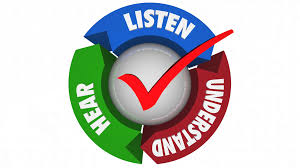A lot of information is available about the importance of listening in workplace communications. There are entire training workshops on active listening, and how important it is to provide 100% of your focus and attention to people when they are speaking to ensure they understand they are being heard.
Active listening is important at work, but it is just as important, or perhaps even more essential, in our personal relationships with our families. At this time of year, as families gather for all types of social events and interactions, this is a perfect time to brush up on your active or deep listening skills and develop your ability to really understand what the people that mean most to you in life are trying to communicate.
Active Listening 101
Most people have had an experience in talking to an individual and feeling they were not heard, not valued, or perhaps not even recognized for their attempt to communicate and interact.
This is often because the other person in the conversation was distracted, did not make eye contact, asked irrelevant questions, or simply nodded or shook their head. In many cases, the other person responded with irrelevant or unrelated information, clearly showing they were not listening.
Active listening is the opposite of these behaviors. It can be done anywhere at any point in time, and it involves:
- Making and maintaining the appropriate eye contact with the speaker
- Ignoring or turning off cell phones and other distractions to be able to give the other person your undivided and uninterrupted attention
- Listening with curiosity rather than to develop advice, suggestions or solutions
- Smiling, nodding when you agree, and asking for more information in a way that encourages rather than discourages the speaker
Asking for More Information
One of the key points of effective listening and communication is to be curious about the information the speakers are sharing. This not only shows your interest, but it demonstrates the importance of the speaker’s message and that you genuinely care.
The holidays are often a time to see family members you do not see on a regular basis. In the annual “catch up” conversations about what is going on in your lives, ask one open ended question of the other person after they finish speaking based on the information they have shared.
Immediately, you have made a connection with the other person that is meaningful and substantial. He or she feels valued, important, and heard in the conversation, which is a wonderful experience in any type of interaction.
Most people are surprised at how much more they can learn about their family and friends. At the same time, you will find people are asking more about the information you want to share, providing opportunities for more meaningful conversations throughout the holidays and the rest of the year.

